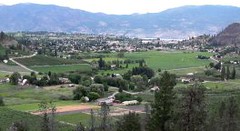Frustrated Orchard Owner
Terry Harnett sent me two items last week that help represent some views we haven't heard here (or in the papers) up until now. This first one is a personal account of his dealings with agricultural land in Summerland. Comments are welcome as always, but please be respectful -- this is Terry's personal experience and I appreciate this submission:
"Back in the early 80's after visiting Summerland several times, I thought to myself, 'this is one hell of a nice place to live',so I purchased a little block of land with apple trees and a house on it. Great! I leased the orchard out to a prominent orchardist in Summerland, as I did not know much about growing apples. Although I came from a dairy farm backround, I new the value of land and thought that this would make me a nice comfortable lifestyle for me.
Several years went by and the orchard was being well looked after, I thought. To my supprise when the lease was up again, the orchardist was not interested in running it anymore! I asked her why and she replied, 'there is not enough return for the amount of work'. I asked, 'why don't you buy it off me?'
She said, 'I'm not that stupid!'
'Thats fine, I'll get someone else.' I was surprised again and again, no one wanted to look after a small orchard. Then the bloody coddling moth! That was the last straw for me. A Cat 966 loader and a couple of dump trucks will fix all my problems. I'll put sheep and cattle on this ALR land and make a couple of bucks, thats what its for -- farming!
But 'Oh NO', it's the smell now. 'O THE SMELL OF GREEN!' ALR Land grows one thing and that's complaints. A large portion of this flat land is unproductive and has no chance of becoming viable land again. Summerlanders -- think smart and cost effectively."


3 Comments:
Although I can sympathise with Terry’s predicament, I don’t think it is that much different from a person who buys property over a sink hole or next to a river that overflows its banks every other year. Caveat Emptor. I, along with many, many others in Summerland and throughout the Okanagan have purchased ALR properties with the illusion of perhaps not striking it rich, but at least making a comfortable living on it. First of all, unless you do 95% of the work yourself you don’t have a chance of making any money on a small acreage property. Secondly, you had better have a second source of income while you are doing this. Thirdly, you have to become very, very familiar with the product you are trying to sell, whether it’s apples or cattle, or as in the case of my neighbours, llamas or buffalos. Your best bet, Terry, is to try to sell it to someone who has the cash to convert the property into a market garden, a high density orchard or anything else that doesn’t offend the olfactory nerves of neighbours.
Frank Martens
By Anonymous, at 9:35 p.m.
Anonymous, at 9:35 p.m.
Thanks for this thoughtful comment, Frank.
If you had to choose between removing 50 acres of orchard from the ALR near downtown for high-density housing OR seeing 50 acres of large homes in a low-density subdivision on the east side of Cartwright Mountain (visible from town), which would you choose?
I know you'd rather choose neither, but work with me on this one...
By Jeremy, at 9:49 a.m.
Jeremy, at 9:49 a.m.
keith carlson said...
I farm a lease block across from Mr. Harnett's property and farm many other blocks in the area. We pay an acreage based lease for 15 years. The cost of the lease per acre is above the going rate charged by the municipality for the same type of lease. Mr. Harnett did not look very hard to either find someone to replant the land or to sell the land. The value of the property is now based on speculation that it can be removed from the ALR. Contrary to what many non farmers believe, orcharding over the last 10 years has been relatively good. In 1990 when I began farming, it was a part-yime job for myself on 10 acres of old orchard. Last year our operation employed over 80 people during the harvest and 6 people all summer. We have invested much time and capital in making our farm a success. That is what it takes to become successful in agriculture. Not holding land and expecting others to make you rich.
Keith Carlson
By Anonymous, at 7:08 p.m.
Anonymous, at 7:08 p.m.
Post a Comment
<< Home